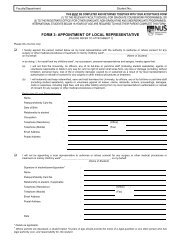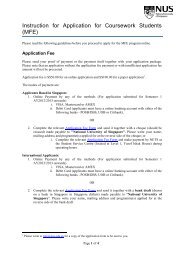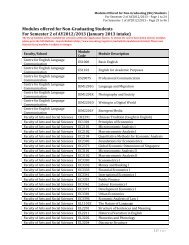engineering
engineering
engineering
You also want an ePaper? Increase the reach of your titles
YUMPU automatically turns print PDFs into web optimized ePapers that Google loves.
The S/U option is not applicable to modules taken to<br />
meet Faculty, Major, Second Major, Minor, or University<br />
Scholars Programme (USP) requirements. Credits earned<br />
from modules taken on an S/U basis may also not be<br />
used to count towards the residency requirement.<br />
Students will exercise their S/U option after the results<br />
are announced for any module that permits the S/U<br />
option.<br />
Assessment of Modules<br />
Each module is assessed by coursework and/or short<br />
tests during the semester and/or a formal examination<br />
at the end of the semester. Some modules such as<br />
research or design projects are assessed as specified by<br />
the department. Up to 40% of the final grade may be<br />
assigned to continuous assessment (CA), and may be<br />
higher for certain modules.<br />
Students are not allowed to repeat modules they<br />
have passed (grade D or better). If they fail a module,<br />
they can retake the failed module in a subsequent<br />
semester.<br />
There are two types of grading options:<br />
• All modules taken on graded basis will count<br />
towards the Cumulative Average Point (CAP). The<br />
CAP is computed for all modules taken using the<br />
point system given in Table 3.1.3a and the MCs of<br />
the modules taken.<br />
The CAP is computed as follows:<br />
CAP = (∑ MC i x GP i) / (∑ MC i )<br />
where MCi is the number of Modular Credits (MCs) for<br />
the i-th module and GPi the grade point (refer to<br />
Table 3.1c) of the i-th module.<br />
• Modules taken on Satisfactory/Unsatisfactory (S/U)<br />
will not count towards CAP. For a module to be<br />
awarded S, the student must achieve grade C for<br />
the module. Modules with grades that are lower<br />
than grade C will be considered as U.<br />
Table 3.1.3a: Relationship between Grades and<br />
Points<br />
Grade Grade Point<br />
A+<br />
5.0<br />
A<br />
A- 4.5<br />
B+ 4.0<br />
B 3.5<br />
B- 3.0<br />
C+ 2.5<br />
C 2.0<br />
D+ 1.5<br />
D 1.0<br />
F 0<br />
For a module taken on S/U, a student will receive credit<br />
only if he attains a Satisfactory grade.<br />
…191…<br />
Stage Promotion<br />
A student will be deemed to have progressed to the<br />
next stage of his study if he has obtained the stipulated<br />
MCs as shown in Table 3.1.3b.<br />
Table 3.1.3b: Stage Promotion Criteria (for single<br />
degree students)<br />
Stage 2 Completed at least 36MCs<br />
Stage 3 Completed at least 76MCs<br />
Stage 4<br />
Completed at least 112MCs<br />
( *IA credits are not included.)<br />
CAP for Continuation and Graduation<br />
To graduate, a student must have a minimum CAP of<br />
2.0. To remain in good academic standing, and to<br />
continue in an undergraduate programme of study, a<br />
student may not have:<br />
• CAP below 1.5 for two consecutive semesters; or<br />
• CAP below 2.0 for three consecutive semesters.<br />
For any semester in which the student’s CAP falls below<br />
the CAP required for graduation (i.e. 2.0), the student<br />
will be issued a warning. If, in the following semester,<br />
the student’s CAP again falls below the graduation<br />
requirement, but not sufficiently to warrant immediate<br />
termination of candidature (i.e. 1.5 ≤ CAP < 2.0), the<br />
student will be placed on probation. If the student’s<br />
CAP falls below 1.5 for two consecutive semesters, or<br />
remains below 2.0 for three consecutive semesters, the<br />
student will be issued a letter of dismissal by the<br />
Registrar, and denied re-admission.<br />
Limit on Level-1000 Modules<br />
Students should not read more than 60 MCs of Level-<br />
1000 modules towards their degree requirements<br />
(minimum of 160 MCs for graduation). For Polytechnic<br />
graduates, 12 MCs of the exempted UE modules will not<br />
count towards the 60 MC limit on level-1000 modules.<br />
Minimum MCs per Semester<br />
The minimum number of Modular Credits (MCs) per<br />
semester to be read by students is 15 MCs.<br />
Maximum candidature<br />
The maximum candidature for the:<br />
• B.Eng. (Hons) degree is five years;, and<br />
• Double Degrees involving the B.Eng. (Hons) is six<br />
years.<br />
3.1.4 First Year of the Engineering Degree Programme<br />
Some students are admitted to the common <strong>engineering</strong><br />
programme while others are admitted into specific<br />
disciplines in the first year.<br />
In the first year of study, common <strong>engineering</strong> students<br />
will be required to read:<br />
‐ MA1505 Mathematics I<br />
‐ MA1506 Mathematics II<br />
‐ CS1010 Programming Methodology (will be<br />
mapped to IT1005/CE2409 for students who enter<br />
Civil/Chemical Engineering)<br />
‐ At least one physics module (either PC1431 Physics<br />
IE or PC1432 Physics IIE) and<br />
‐ At least two <strong>engineering</strong> modules from MLE1101<br />
Introductory Materials Science and Engineering,<br />
GI<br />
FASS<br />
BIZ<br />
SoC<br />
FoD<br />
SDE<br />
FoE<br />
NGS<br />
FoL<br />
YLLSoM<br />
FoS<br />
USP<br />
DUKE-NUS<br />
LKYSPP<br />
YSTCM<br />
TI<br />
Others







